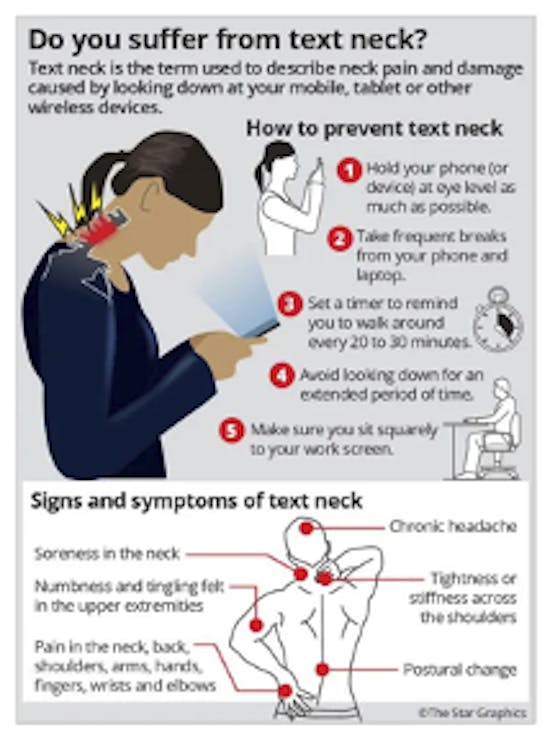Samantha Crisafulli PT, DPT, Cert. DN

Who knew 30 years ago we would be in a world where we cannot survive without a tiny device in our hands? Unfortunately, we are all guilty for being slumped over our phones, tablets, computers and kindles for hours every day. There are a lot of pros to the advantages made in the technology world but with repetitive smartphone/computer usage, comes a long list of neck, shoulder and middle to upper and even lower back problems.
Neck pain is already one of the major musculoskeletal disorders in the adult population that is not only brought on by poor posture but also factors such as but are not limited to strenuous physical activity, motor vehicle accidents, body mass index (BMI), genetics, smoking and stress/depression. Looking down and dropping your head forward changes the curvature of your neck, which causes your shoulders to round forward. Overtime, this can cause wear and tear on the neck and back and lead to chronic problems.
In my opinion, physical therapists are going to start to see a much younger population being referred to therapy by a doctor for neck pain due to the increased use of technology in schools and at home. The good news is that a physical therapist is a great option for improving neck, shoulder and spinal range of motion (ROM), flexibility and strength as well as posture that can decrease your risk of developing muscle strains, muscle spasms or more serious conditions.
With a referral from your doctor, a physical therapist will perform a mechanical and musculoskeletal exam that includes an assessment of posture, joint alignment and testing of muscular strength, flexibility and nerve involvement. Physical therapy will focus on increasing ROM, strength and flexibility most likely concerning the neck, shoulders and upper to middle back. Physical therapists will also show you proper ways to hold or look at your phone/computer to decrease the risk for neck problems. It will also include soft tissue mobilization and other manual techniques to increase blood flow to a region where pain is experienced with the aim to allow the patient to get back to their daily life and work-related activities pain-free.
At Professional Rehabilitation Services, we treat a wide variety of musculoskeletal and neurological conditions using the latest in evidence-based therapies provided by highly credentialed physical therapists. Professional Rehabilitation Services has eight convenient locations in Pawleys Island, Murrells Inlet, Surfside Beach, Market Common, Myrtle Beach, Carolina Forest, Conway, and Little River.
For further information on this or other related topics you can contact Richard DeFalco, DPT, OCS, CSCS, CWcHP at Professional Rehabilitation Services (Myrtle Beach) (843) 839-1300, Brian P. Kinmartin PT, DPT, MTC, STC, OCS, CWcHP (Pawleys Island) (843) 235-0200, Richard A. Owens, MPT, OCS, Cert. SMT, CWcHP (Surfside) (843) 831-0163, Jill P. Phelan, PT, DPT, Cert. DN (Conway) (843) 773-3031, Lisa O'Brien, PT, DPT, Cert. DN (Murrells Inlet) (843) 314-3224, Brandon Stanley, PT, DPT, Cert. DN (Longs/Little River) Longs - (843)491 - 0388 Little River - (843) 281- 4222, Samantha Crisafulli PT, DPT, Cert DN. (Carolina Forest) (843) 282-0440, Zach Daniels PT, DPT, Cert. DN (Market Commons) (843) 213-6338 or visit our website a www.prsrehabservices.com where you can learn more about the company and even download a referral form for your physician to fill out. You can also call and schedule a free 15-minute consultation.
